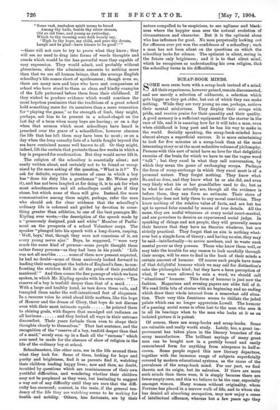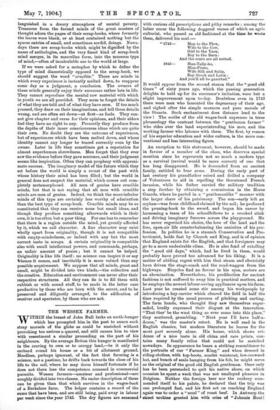SCRAP - BOOK MINDS.
SOME men seem born with a scrap-book instead of a mind. All their experiences, however gained, remain disconnected, and are merely a selection of oddments, a selection which gets bigger as they get older, but out of which they can make nothing. While they are very young no one, perhaps, notices their mental misfortune. They display their scraps with pride, and receive praise for their quantity and their quality. A good memory is a sufficient equipment for the starter in the race of life, and it is amazing how far it will take a man, even when childhood is long past and he has his way to make in the world. Socially speaking, the scrap-book-minded have almost always a superficial success. It is more entertaining to look for five minutes at a scrap-book than at the most interesting story or at the most seductive volume of philosophy. Persons with this sort of'mind have no love for that delightful exercise of the brain for which we have to use the vague word " talk " ; but they excel in what they call conversation, by which they mean the game of exchanging scraps. Perhaps the form of scrap-exchange in which they excel most is of a personal nature. They forget nothing. They know what So-and-so does, and they know what be or she did, and even very likely what his or her grandfather used to do; but as to what he and she actually are, though all the evidence is before them, they can form no estimate. Their store of knowledge does not help them to any moral conviction. They know nothing of the relative value of facts, and are but too apt to spread false scandal by means of true details. All the same, they are useful witnesses at every social court-martial, and are powerless to deceive an experienced social judge. In speaking of things and not people, they will generally assure their hearers that they have no theories whatever, but are strictly practical. They forget that an aim is nothing what- ever but a simple form of theory ; and having no aim, they may be said—intellectually—to arrive nowhere, and to waste such mental power as they possess. Those who know them well, or may take the trouble for any reason to look carefully through their scraps, will be sure to find in the book of their minds a certain amount of humour. Of course such people have none of that delightful humour which we may call for distinction's sake the philosophic kind; but they have a keen perception of what, if we were allowed to coin a word, we should. call " situational " humour. This form of humour is just now the fashion. Magazines and evening papers are alike full of it. We read little bits of stories with no beginning and no ending which draw their whole interest from a somewhat odd situa- tion. Their very thin funniness seems to titillate the jaded palate which can no longer appreciate Lowell. The humour of a passing social scene is often lost to the man who sees it in all its bearings when to the man who looks at it as an isolated picture it is patent.
Of course, there are scrap-books and scrap-books. Some are valuable and really worth study. Lately, too, a great im- provement has taken place in the literary branches of the scrap manufacture. The brilliant sayings of many great men can be bought now in a prettily bound and easily remembered form for anything from ninepence to half-a- crown. Some people regard this new literary departure, together with the immense range of subjects superficially covered by modern educational systems, as the cause of the prevalence of the scrap-book mind. For our part, we find therein not its origin, but its salvation. If there are more such minds than there were, it is simply because there are fewer empty ones, and this we believe to be the case, especially amongst women. Many women without originality, whom Fortune has placed in a narrow walk of life, and to whom she has denied all absorbing occupation, may now enjoy a sense of intellectual affluence, whereas but a few years ago they
languished in a dreary atmosphere of mental poverty. Treasures from the fecund minds of the great masters of thought adorn the pages of their scrap-books, where formerly the leaves were blank, or at least contained nothing but the sparse entries of small, and sometimes sordid, doings. Nowa- days there are scrap-books which might be dignified by the name of anthologies, and the very finest kind of scrap-book mind merges, in its masculine form, into the museum type of mind,—often of incalculable use to the world at large.
If we were asked for a metaphor by which to define the type of mind diametrically opposed to the scrap-book, we should suggest the word "crucible." There are minds in which every experience is instantly melted down, to reappear some day as a judgment, a conclusion. The owners of these minds generally enjoy their successes rather late in life. They cannot reproduce the mental raw material with which in youth we are all provided. They seem to forget the details of what they are told and of what they have seen. If too much pressed, they draw on their imaginations, and tell these details wrong, and are often set down—at first—as fools. They can- not give chapter and verse for their opinions, and their elders feel they have no right to any. Presently they produce from the depths of their inner consciousness ideas which are quite their own. No doubt they are the outcome of experiences, but of experiences which have been melted down, and whose identity cannot any longer be traced correctly even by the owner. Later in life they sometimes get a reputation for almost superhuman shrewdness. Men forget that they ever saw the evidence before they gave sentence, and their judgment seems like inspiration. Often they can prophesy with approxi- mate success. The imaginary model of the future which they set before the world is simply a recast of the past with whose history their mind has been filled ; but the world in general does not suspect the material, which comes out com- pletely metamorphosed. All men of genius have crucible minds, but that is not saying that all men with crucible minds are men of genius. Indeed, we think the more inferior minds of this type are certainly less worthy of admiration than the best type of scrap-book. Crucible minds may be so constituted that they can receive none but small ideas, and though they produce something afterwards which is their own, it is too often but a poor thing. For one has to remember that there is a region outside the mind, yet greatly affected by it, which we call character. A fine character may exist -wholly apart from originality, though it is not compatible with empty-mindedness, or indeed with any but the most correct taste in scraps. A certain originality is compatible also with small intellectual powers, and commands, perhaps, an unfair amount of praise ; but it cannot be helped. Originality is like life itself : no science can inspire it or say vhence it comes, and inevitably it is more valued than any possible acquirement. We suppose that all minds, great and small, might be divided into two kinds,—the collective and the creative. Education and environment can never alter their respective strictures. All they can do is to fill them with rubbish or with sound stuff, to be made in the latter case productive by those who are born with the secret, and to be preserved and diligently arranged, to the edification of receiver and spectator, by those who are not.











































 Previous page
Previous page